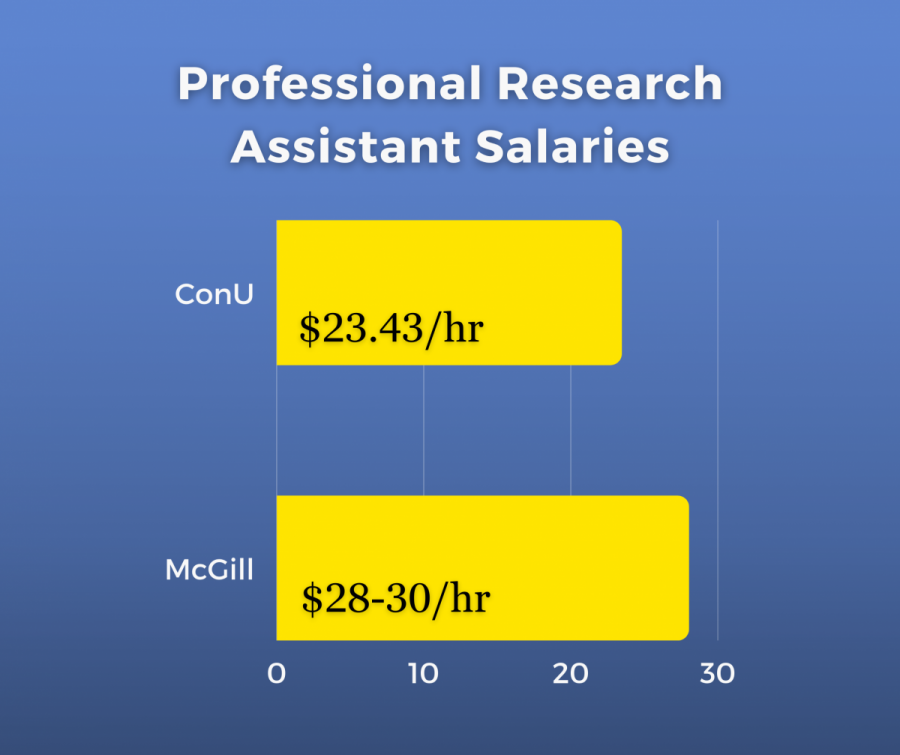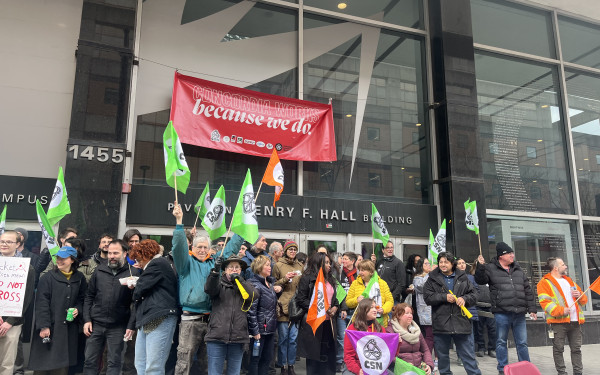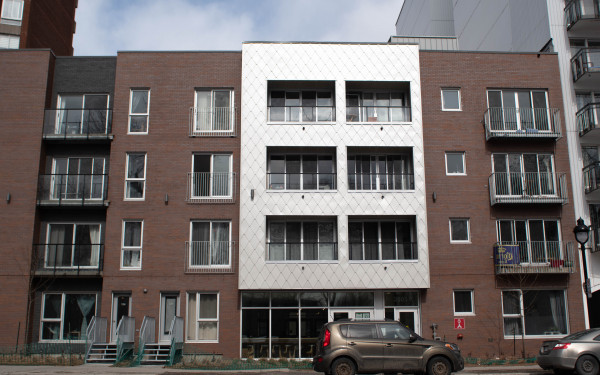The fight for fair pay continues
Care and CREW-CSN are demanding better wages for TAs and RAs
Unions across campus have started negotiations with Concordia University to increase workers’ pay and sign new collective agreements.
The Concordia Association of Research Employees (CARE) has been at the negotiating table for over a year, demanding livable wages that match inflation and that are comparable to other universities in Montreal.
According to the union’s secretary-treasurer, Gabrielle McLaren, negotiations with Concordia have been “extremely difficult.” CARE’s collective agreement expired on May 31, 2022 and the union started negotiations three months later. However, McLaren noted that Concordia didn’t want to budge on salaries.
“They've been really unflinching, which is a problem,” she said. “It took us a really, really long time to even get Concordia to talk about money.”
She said she believes Concordia’s unwillingness to increase salaries is unfounded when comparing research employee salaries to those at McGill. “[McGill] just takes research more seriously and it shows financially,” she said.
Depending on the job employees unionized under CARE have, the hourly salary as a research assistant (RA) is a minimum of $23.43 per hour. In contrast, McGill pays RAs a minimum of $28 to $30 per hour.
By November 2022, negotiations were slower than CARE would have liked. “It became really clear that it was sort of [Concordia’s] way or the highway, which isn't how bargaining works. That's not how negotiations work,” McLaren said. Then, CARE decided to take matters into their own hands.
On Feb. 22, 2023, one hour before their meeting with Concordia’s negotiating team, CARE members gathered in front of the Faubourg Building, giving out flyers and informing passersby on the need for an increase in RA wages. The gathering was quickly shut down by Concordia security, who asked union members for their IDs.
“It became really clear from the start of that meeting that the university was unhappy that they had been greeted downstairs by our group, and it was a really difficult meeting that ended up with Concordia telling us that if we didn't agree with them, we should just leave,” McLaren said.
For McLaren, the meetings weren’t productive anymore. “[Concordia] wasn't respecting what we were bringing to the table, they weren't showing up at meetings ready,” she said.
CARE then moved to conciliation, a step in bargaining where a neutral party would get involved to facilitate and fast-forward negotiation discussions.
“At first, we were sensing a change of attitude,” McLaren said. “Tensions in the room were releasing, the dialogue was more productive, but [...] that did not last.”
In early August, Concordia presented an offer. Although some demands were met, the minimum salary was not increased for 2023. “It is ridiculous, given inflation. Plus, the minimums aren't that high, they're like $21,” she said.
Concordia refusing to increase wages was unacceptable for CARE. “You're asking people to have research expertise, to have specialized skills with different software, different computing, different financial systems, different administrations; that's not a competitive salary,” said McLaren.
CARE didn’t accept the offer and waited until September for Concordia’s new offer, which never came.
“Often our colleagues would ask, ‘How'd it go?’ And it was really tough,” she said. “How do I tell them that the employer just wasted two months of our time in the most diplomatic way possible.”
According to Vannina Maestracci, Concordia’s spokesperson, “The parties continue to negotiate and we are committed to reaching an agreement.”
The struggle for better pay has been felt by CARE and CREW-CSN alike.
Zachary Mitchell, a CREW-CSN militant and a teaching assistant (TA) and RA in the history department, said that considering inflation hit 5.2 per cent, the union will demand pay to at least match inflation.
“Fundamentally, a lot of us are being priced out of our own city. This is where we work, this is where we live. If we can't afford rent, if we can't afford food, what are we supposed to do?”
Mitchell said a better working environment culturally would benefit TAs and RAs as a whole. “We're contracted for [a certain] number of hours, but often the expectation is to work above those hours, and there's a real culture around it that's developed over the years,” he said.
Mitchell added that Concordia’s negotiation strategies should change in order for unions to see change. “Concordia really has signalled sort of a policy of austerity in the past years, despite record inflation, but a very selective austerity,” he said.
He used Concordia President Graham Carr’s 10 per cent salary increase as an example in contrast to their strict no-pay increases for unions.
“Some of the unions here, even ones which are asking for very little—like four or five per cent—they're kind of getting snubbed,” Mitchell said.
Mitchell added that all hope is not lost. “When things fail at the bargaining table, that's when unions begin to take larger steps doing things like industrial action, possibly even escalating eventually to strikes,” he said.
This article originally appeared in Volume 44, Issue 4, published October 17, 2023.





__600_375_90_s_c1.jpg)
